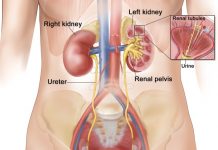 The bladder is a cavity organ situated in the lower part of the body. Its primal role is to collect urine; the residue resulted from the blood filtration in the kidneys.
The bladder is a cavity organ situated in the lower part of the body. Its primal role is to collect urine; the residue resulted from the blood filtration in the kidneys.
The bladder has a muscular wall which allows it to increase and decrease in size according to the amount of urine kept inside it.
The cancer screening represents the examination or testing of the persons having as purpose the early discovery and identification of the cancer signs even if there are no illness signs present.
It was identified that there is a certain target group of people that present the predisposition for the bladder cancer and that predisposition is directly linked to their way of life and the environmental factors.
This information helped the doctors understand what persons need to be tested for this type of cancer and what type of tests have to be performed.
Since not all screening tests are useful, because many of them present the risk of injuring or hurting the internal bladder wall, the recommended biopsy needs to be done in a specialized environment.
That is why it is best for the patient to undergo a specific screening procedure accurate for the exact type of investigation he needs.
If the doctor suggests some screening tests for the cancer as part of the investigation plan of the health status this does not mean he actually suspects a bladder cancer. The screening tests are done when there are no cancer symptoms.
The hematuria testing is one of the most common tests; the urine is examined in order to discover the presence of blood traces with the purpose of discovering the signs of cancer in the bladder or in the kidney lining.
The hematuria is not very relevant but it can show primal results and recommend the further analysis.
Citoscopia is done by introducing a thin tube with a source of light through the urethra and bladder. During this procedure there can be harvested tissue fragments for a further microscope analysis. This examination proves to be very effective for the patients previously diagnosed with bladder cancer.
Other screening testing methods are in study. The doctor decides what tests are recommendable for each of the patients and the results of the screening can be very conclusive in identifying bladder cancer signs in the very early stages.
If there are clear cancer symptoms present the doctors recommend further testing that is used to confirm the suspicious.











